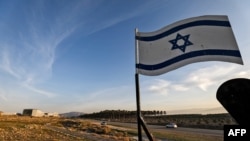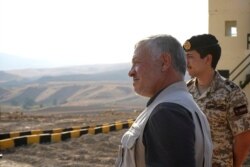Jordan’s King Abdullah II could be facing the most serious decisions of his 21 years on the throne, should Israel follow through with plans to annex parts of the West Bank on July 1, analysts say. As only one of two Arab peace partners with the Jewish state, they say such an Israeli move would spark a volatile reaction from the Jordan’s own population and mark the end of a two-state solution which the monarch has championed to resolve the decades-long Israeli-Palestinian conflict.
Jordanian analyst Osama Al Sharif is watching opposition grow within neighboring Israel to Prime Minister Benjamin Netanyahu’s pledge to annex some 30 percent of the West Bank which it has occupied since 1967, including Israeli settlements and areas populated mainly by Palestinians.
The Palestinians have condemned any annexation, urging the international community to impose sanctions on Israel and to bilaterally recognize Palestine as a state.
Al Sharif says members of Israel’s unity Cabinet, society, and even some Jewish settlers as well as former generals and security officials, have warned of the political costs and threats to Israel’s long-term security. Others oppose the plan devised by U.S. President Donald Trump because it also calls for a Palestinian state.
Al Sharif told VOA that Netanyahu may have to revise his proposal.
"It’s seems now we are talking about 'annexation light,' a much-reduced version from the one that Netanyahu was actually proposing. Netanyahu is cherry-picking, taking what he wants from Trump’s peace plan and leaving the rest. If it happens on the first of July, it will be very symbolic, and it might be limited to extending sovereignty over a couple Israeli settlements that surround Jerusalem. It will most likely exclude the Jordan Valley at this stage. The whole thing is going through a change of direction because of divisions," Al Sharif said.
Last month, Jordan’s King Abdullah pointedly told the German Der Spiegel magazine that “if Israel really annexes the West Bank in July, it would lead to a massive conflict with the Hashemite Kingdom of Jordan.” He said that he was studying “all options.”
Bruce Reidel, a Brookings Institution senior fellow in Washington, says those could include annulling Jordan’s 1994 peace treaty with Israel, along with security agreements, as well as ending an unpopular $10 billion natural gas deal with Israel, or withdrawing Jordan’s ambassador from Tel Aviv.
Meanwhile, Jordan has pursued intensive diplomacy to try to pre-empt annexation.
International pressure is also bearing down. Germany has called Israel’s planned annexation “contrary to international law” and its prevention a “priority.”
The United Arab Emirates Ambassador to Washington Yousef al-Otaiba warned Israel that “annexation will immediately upend Israeli aspirations for improved …ties with the Arab world and the UAE.”
Al Sharif said King Abdullah has toned down his rhetoric because he is also watching Israeli discussions on the annexation issue.
"Jordan, Egypt, Saudi Arabia, the UAE all expressed different levels of their rejection of annexation and its dire consequences on stability and the region, not to mention the Palestinian reaction at the end," Al Sharif said.
Jordan and other Arab states believe annexation will shut the door permanently on a viable future Palestinian state and could spark Palestinian violence.






